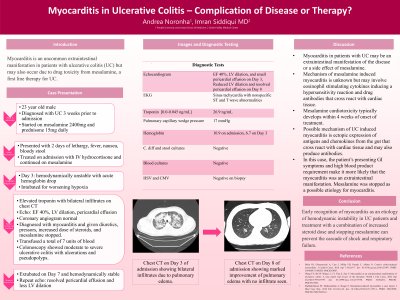Monday Poster Session
Category: IBD
P2265 - Myocarditis in Ulcerative Colitis - Complication of Disease or Therapy?
Monday, October 23, 2023
10:30 AM - 4:15 PM PT
Location: Exhibit Hall

Has Audio
- AN
Andrea Noronha, BS
Lewis Katz School of Medicine
Philadelphia, PA
Presenting Author(s)
Andrea Noronha, BS1, Imran Siddiqui, MD2
1Lewis Katz School of Medicine, Philadelphia, PA; 2Desert Valley Hospital, Victorville, CA
Introduction: Myocarditis is an uncommon extraintestinal manifestation in patients with ulcerative colitis (UC) but may
also occur due to drug toxicity from mesalamine, a first line therapy for UC.
Case Description/Methods: A 23-year-old male recently diagnosed with UC 3 weeks ago presented with lethargy, nausea, bloody
stool and fever for 2 days. At time of diagnosis 3 weeks ago, he was started on mesalamine 2400mg and
prednisone 15mg daily. On admission, he was given intravenous hydrocortisone and continued on
mesalamine. On day 3 of admission, the patient became increasingly hemodynamically unstable over 12-
14 hours with decreasing blood pressure (as low as 71/55) and an acute decrease in hemoglobin. He was
given fluids, blood, and later intubated for worsening hypoxia. Patient had elevated troponin.
Echocardiogram showed an ejection fraction of 40%, mild global hypokinesis, left ventricular (LV)
dilatation and small pericardial effusion. Coronary angiogram showed normal coronaries. Chest x-ray
showed bilateral infiltrates. Swan-Ganz showed elevated left sided pressures. Patient was diagnosed with
acute myocarditis and given diuretics, pressors, and increased dose of corticosteroids. Broad spectrum
antibiotics started earlier, were stopped after negative cultures and Clostridium difficile toxin. Mesalamine was
stopped. Patient then had decreasing oxygen requirements and became hemodynamically stable. He
was successfully extubated 4 days later and was placed on oral steroids and hydrocortisone enemas.
Repeat echo 5 days after initial echo showed decreased LV dilatation and resolved pericardial effusion.
Patient was discharged on prednisone 40mg, hydrocortisone enemas and carvedilol 3.125mg twice daily.
Discussion: Myocarditis in patients with UC may be an extraintestinal manifestation of the disease or a side effect of
mesalamine. The mechanism of mesalamine induced myocarditis is unknown, but theories include
increased eosinophil-stimulating cytokines leading to a hypersensitivity reaction and drug antibodies that
cross react with cardiac tissue. Typically, mesalamine cardiotoxicity begins within 4 weeks of onset of
treatment. Myocarditis can also develop as an extra-intestinal manifestation of UC flare-up. Irrespective of
the cause, albeit mesalamine toxicity or UC flare-up, early recognition of myocarditis as an etiology of
hemodynamic instability in UC patients and treatment with a combination of increased steroid dose and
stopping mesalamine can prevent the cascade of shock and respiratory failure.
Disclosures:
Andrea Noronha, BS1, Imran Siddiqui, MD2. P2265 - Myocarditis in Ulcerative Colitis - Complication of Disease or Therapy?, ACG 2023 Annual Scientific Meeting Abstracts. Vancouver, BC, Canada: American College of Gastroenterology.
1Lewis Katz School of Medicine, Philadelphia, PA; 2Desert Valley Hospital, Victorville, CA
Introduction: Myocarditis is an uncommon extraintestinal manifestation in patients with ulcerative colitis (UC) but may
also occur due to drug toxicity from mesalamine, a first line therapy for UC.
Case Description/Methods: A 23-year-old male recently diagnosed with UC 3 weeks ago presented with lethargy, nausea, bloody
stool and fever for 2 days. At time of diagnosis 3 weeks ago, he was started on mesalamine 2400mg and
prednisone 15mg daily. On admission, he was given intravenous hydrocortisone and continued on
mesalamine. On day 3 of admission, the patient became increasingly hemodynamically unstable over 12-
14 hours with decreasing blood pressure (as low as 71/55) and an acute decrease in hemoglobin. He was
given fluids, blood, and later intubated for worsening hypoxia. Patient had elevated troponin.
Echocardiogram showed an ejection fraction of 40%, mild global hypokinesis, left ventricular (LV)
dilatation and small pericardial effusion. Coronary angiogram showed normal coronaries. Chest x-ray
showed bilateral infiltrates. Swan-Ganz showed elevated left sided pressures. Patient was diagnosed with
acute myocarditis and given diuretics, pressors, and increased dose of corticosteroids. Broad spectrum
antibiotics started earlier, were stopped after negative cultures and Clostridium difficile toxin. Mesalamine was
stopped. Patient then had decreasing oxygen requirements and became hemodynamically stable. He
was successfully extubated 4 days later and was placed on oral steroids and hydrocortisone enemas.
Repeat echo 5 days after initial echo showed decreased LV dilatation and resolved pericardial effusion.
Patient was discharged on prednisone 40mg, hydrocortisone enemas and carvedilol 3.125mg twice daily.
Discussion: Myocarditis in patients with UC may be an extraintestinal manifestation of the disease or a side effect of
mesalamine. The mechanism of mesalamine induced myocarditis is unknown, but theories include
increased eosinophil-stimulating cytokines leading to a hypersensitivity reaction and drug antibodies that
cross react with cardiac tissue. Typically, mesalamine cardiotoxicity begins within 4 weeks of onset of
treatment. Myocarditis can also develop as an extra-intestinal manifestation of UC flare-up. Irrespective of
the cause, albeit mesalamine toxicity or UC flare-up, early recognition of myocarditis as an etiology of
hemodynamic instability in UC patients and treatment with a combination of increased steroid dose and
stopping mesalamine can prevent the cascade of shock and respiratory failure.
Disclosures:
Andrea Noronha indicated no relevant financial relationships.
Imran Siddiqui indicated no relevant financial relationships.
Andrea Noronha, BS1, Imran Siddiqui, MD2. P2265 - Myocarditis in Ulcerative Colitis - Complication of Disease or Therapy?, ACG 2023 Annual Scientific Meeting Abstracts. Vancouver, BC, Canada: American College of Gastroenterology.
